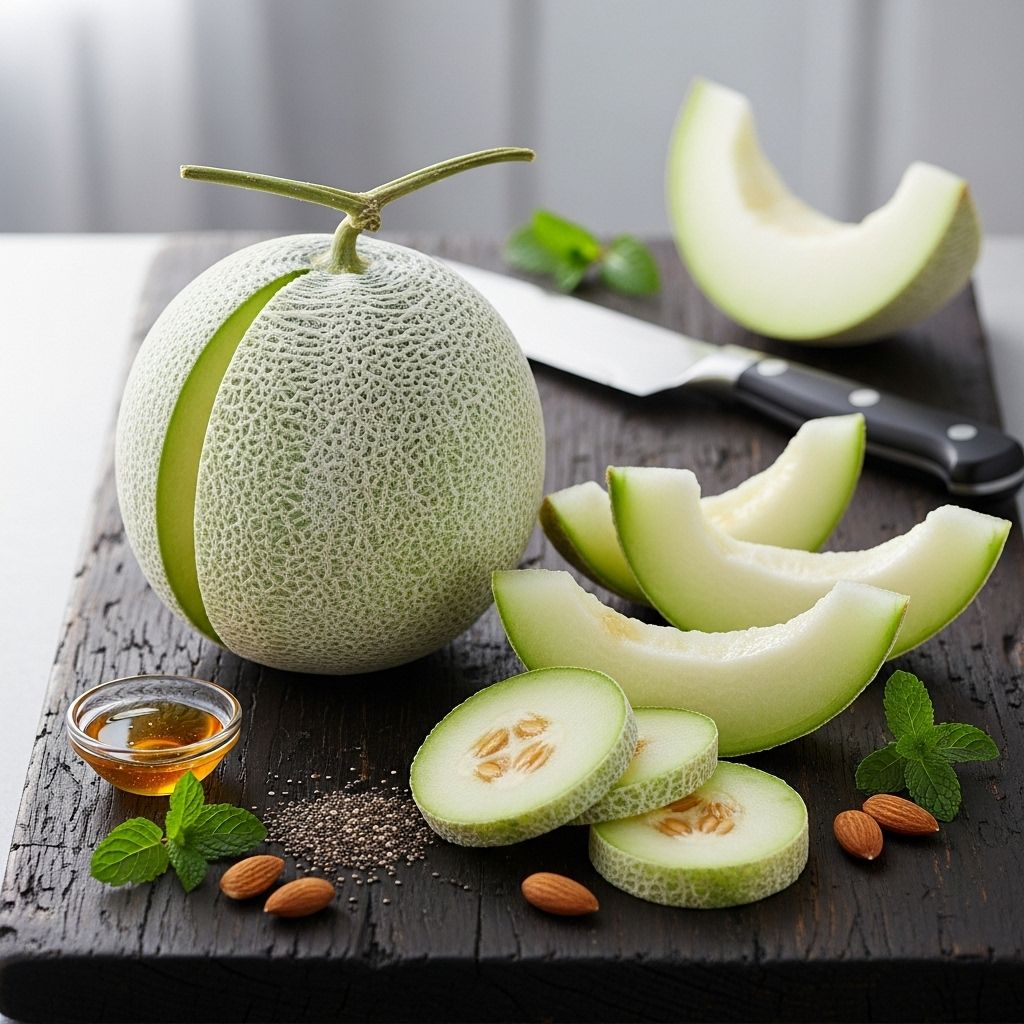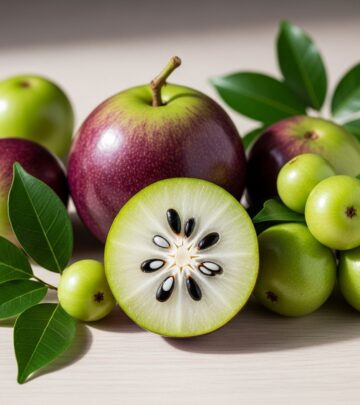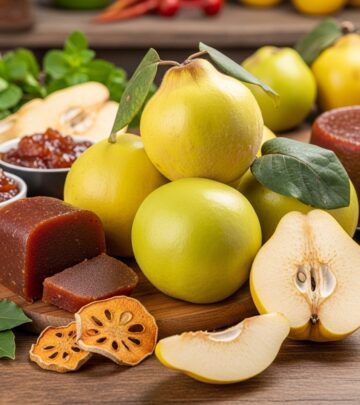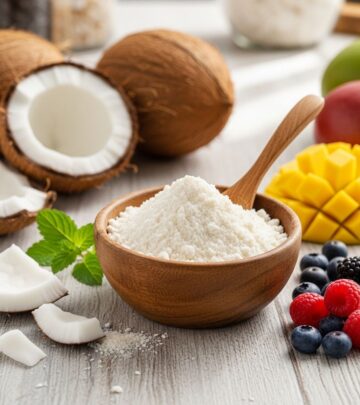Winter Melon: Nutrition, Health Benefits, Uses, and FAQs
This versatile gourd delivers gentle hydration and nutrient power in every bite.

Winter melon (Benincasa hispida), also known as ash gourd, white pumpkin, or petha, is a large vine-grown vegetable treasured in many Asian cuisines and traditional healing systems. With its mild taste, high water content, and impressive nutrient profile, winter melon contributes a spectrum of health benefits—from digestive health to immune strength. This comprehensive guide explores all about winter melon: its nutritional composition, proven advantages, culinary uses, possible side effects, and answers to the most common questions.
What Is Winter Melon?
Winter melon is a member of the gourd family grown across Asia for centuries. It is recognized by its large size, oblong shape, and pale green waxy skin that develops a powdery white coating as it ripens—hence the name “ash gourd.” The flesh is mild-flavored, watery, and pale, making it an excellent base for both savory and sweet dishes.
- Common names: Ash gourd, Wax gourd, White gourd, Petha (in Hindi), Dong Gua (Chinese)
- Family: Cucurbitaceae (same as cucumber, squash, and pumpkin)
- Parts used: Flesh, seeds, and even the rind in regional dishes
Nutritional Profile of Winter Melon
Winter melon is both low in calories and high in water—about 95% by weight—making it ideal for hydration, weight management, and nutrient density. Here is a detailed breakdown of its nutritional values per 100 grams:
| Nutrient | Amount (per 100g) | % Daily Value (DV) |
|---|---|---|
| Calories | 13 kcal | 1% |
| Water | Over 95g | — |
| Carbohydrates | 3g | 1% |
| Dietary Fiber | 2.9g | 12% |
| Protein | 0.4g | 1% |
| Total Fat | 0.2g | 0% |
| Vitamin C | 13 mg | 14% |
| Vitamin B1 (Thiamine) | 0.04 mg | 3% |
| Vitamin B2 (Riboflavin) | 0.11 mg | 8% |
| Vitamin B3 (Niacin) | 0.4 mg | 3% |
| Calcium | 19 mg | 2% |
| Iron | 0.4 mg | 5% |
| Sodium | 111 mg | 5% |
| Potassium | 6 mg | 0% |
| Zinc | 0.61 mg | 6% |
| Folate | 5 µg | 1% |
In addition to these, winter melon contains small but useful amounts of magnesium, manganese, copper, and other trace minerals. It is virtually fat-free, cholesterol-free, and has negligible sugar content, making it suitable for most diets.
Proven Health Benefits of Winter Melon
Winter melon offers a combination of vitamins, minerals, antioxidants, and dietary fiber, directly contributing to a range of health benefits:
1. Supports Weight Loss and Management
- Low calorie density: With only 13 calories per 100g and high water and fiber, winter melon provides satiety without excess energy intake.
- Promotes fullness: Soluble fiber forms a gel-like substance in the digestive tract, slowing digestion and helping you feel fuller for longer, which may reduce cravings and overall calorie intake.
- Some studies associate increased dietary fiber and low-calorie foods like winter melon with small but significant weight loss effects.
2. Enhances Digestive Health
- Rich in dietary fiber: Fiber regulates bowel movements, prevents constipation, and fosters healthy gut bacteria.
- Regular intake may help reduce risks of digestive disorders such as irritable bowel syndrome (IBS), diverticular disease, and hemorrhoids.
- The natural water content soothes inflammation in the digestive tract, relieving cramping and bloating.
3. Boosts Immunity
- Abundant vitamin C: Triggers the production of white blood cells, key defenders against pathogens.
- Zinc: Further enhances immune response, crucial for fighting infections and supporting skin healing.
- Winter melon consumption may help reduce risk or duration of common illnesses like colds and flu.
4. Promotes Heart Health
- Dietary fiber: Can help lower “bad” LDL cholesterol, reducing the risk of heart disease and supporting overall cardiovascular health.
- Low sodium & potassium: While winter melon is not high in potassium, it is naturally low in sodium and cholesterol, supporting blood pressure regulation for most people.
5. Offers Antioxidant Protection
- Contains a variety of antioxidants—including vitamin C, lutein, zeaxanthin, and beta-carotene—that help neutralize free radicals and reduce oxidative stress associated with chronic diseases.
- Antioxidant content supports healthy aging by protecting cells from environmental and metabolic damage.
6. Supports Vision Health
- Lutein, zeaxanthin, and beta-carotene protect the eyes from degeneration and loss of vision, while vitamin C may reduce the risk of cataracts and other eye conditions.
7. Improves Cognitive Function
- Iron content: Supports healthy blood circulation, ensuring more oxygen reaches the brain, which aids memory, focus, and mental performance.
8. Promotes Growth & Development
- Vitamin C: Beyond immunity, vitamin C supports formation of collagen, essential for strong bones, connective tissue, and wound healing.
9. Boosts Energy Levels
- Vitamin B2 (Riboflavin): Essential for efficient energy metabolism, helping convert food into usable energy and supporting hormonal balance.
10. May Regulate Blood Sugar
- Dietary fiber helps slow the absorption of sugar, supporting better glucose control and making winter melon a wise addition to diabetic diets (with physician guidance).
11. May Support Hydration and Detoxification
- Water content: Helps maintain hydration, especially in hot climates or when consumed as a cooling beverage.
- Traditional medicine often attributes gentle diuretic properties to winter melon, which may aid kidney function and mild detoxification.
How To Use Winter Melon
Winter melon’s delicate flavor and crisp, watery texture make it a remarkably versatile vegetable in both sweet and savory dishes:
Popular Culinary Uses
- Soups & Stews: Adds subtle flavor to Asian broths and stews, especially when combined with ginger, pork, or mushrooms.
- Stir-Fries: Sliced or cubed and sautéed with spices and sauces for a quick, nutritious side.
- Curries: Common in Indian, Chinese, and Southeast Asian curries, absorbing bold flavors beautifully.
- Juice & Tea: Served as a hydrating beverage, sometimes sweetened with honey or palm sugar.
- Candied (Petha): In North India, winter melon is boiled in syrup and crystallized into a sweet delicacy called petha.
- Desserts: Used in jams, jellies, and Chinese confections.
Tips For Buying & Storing
- Choose firm, unblemished melons with a uniform, powdery coating.
- Keep whole, uncut melons in a cool, dry place for weeks; cut pieces should be wrapped and refrigerated for up to 3–5 days.
Precautions and Possible Side Effects
- Mild food allergies: As with any food, rare allergic reactions may occur—introduce winter melon gradually, especially to children.
- Pregnancy & medication: There are no strongly documented risks, but pregnant women and individuals on diuretics or blood pressure medication should consult a doctor before regular use due to possible mild diuretic effects.
- Excess consumption: Overeating may lead to digestive discomfort, such as bloating or loose stools, because of the high fiber and water content.
Winter Melon vs. Other Gourds: Comparison Table
| Feature | Winter Melon | Bottle Gourd | Pumpkin |
|---|---|---|---|
| Main nutrient | Vitamin C, Fiber | Potassium | Vitamin A, Beta-carotene |
| Water content | High | High | Medium |
| Calories/100g | 13 kcal | 14 kcal | 26 kcal |
| Sugar content | Very low | Low | Medium |
| Traditional use | Soups, desserts | Juice, curries | Pies, soups |
Frequently Asked Questions (FAQs) about Winter Melon
Q1: What does winter melon taste like?
Winter melon has a very mild taste—slightly sweet, clean, and somewhat similar to cucumber but less intense. Its gentle flavor absorbs the spices and seasonings used in cooking.
Q2: Is winter melon good for weight loss?
Yes. Its low calorie content, high water, and high fiber make winter melon an excellent addition to weight management diets, helping promote fullness and reduce cravings.
Q3: Can winter melon be eaten raw?
Although often cooked, winter melon can be consumed raw in fresh salads, juices, or smoothies. Ensure it is thoroughly washed and peeled to remove the waxy coating and dirt.
Q4: Does winter melon have any side effects?
Winter melon is considered very safe for most people. In rare cases, overconsumption may cause mild digestive discomfort. If you have chronic illness or are pregnant/nursing, consult your doctor before including it in large amounts in your diet.
Q5: Is winter melon the same as bottle gourd or pumpkin?
No. Winter melon (ash gourd) is a different species than bottle gourd and pumpkin. Each has unique nutritional profiles and uses, though all are members of the gourd family.
Q6: What are some popular winter melon dishes?
- Chinese winter melon soup with pork or mushrooms
- Indian ash gourd curry (kumbalanga curry)
- Winter melon stir-fries or jams
- Candied petha (sweet from India)
Q7: Can people with diabetes eat winter melon?
Winter melon is low in sugar and glycemic index, making it suitable for most people with diabetes, but portion control and medical guidance are always recommended.
Conclusion
Winter melon is a hydrating, adaptable vegetable with substantial health benefits thanks to its nutrient density, high fiber, vitamins, and antioxidants. Whether used in soups, sweets, or herbal remedies, its daily inclusion can significantly improve your well-being. As with any dietary change, moderation is key, and those with specific health conditions should speak with a healthcare provider before large-scale inclusion.
References
- https://healthiersteps.com/winter-melon/
- https://foodstruct.com/food/winter-melon
- https://www.lybrate.com/topic/winter-melon-petha-benefits-and-side-effects
- https://www.healthline.com/nutrition/ash-gourd
- https://draxe.com/nutrition/winter-melon/
- https://www.organicfacts.net/health-benefits/vegetable/winter-melon-benefits-nutritional-value.html
- https://isha.sadhguru.org/en/blog/article/ash-gourd-benefits-recipes
- https://www.picturethisai.com/benefits/Benincasa_pruriens_f._hispida.html
Read full bio of Sneha Tete













